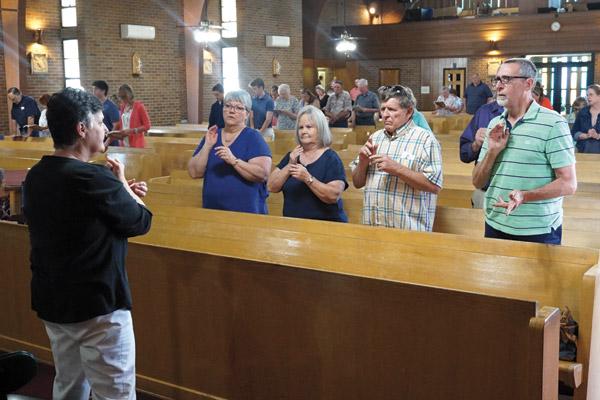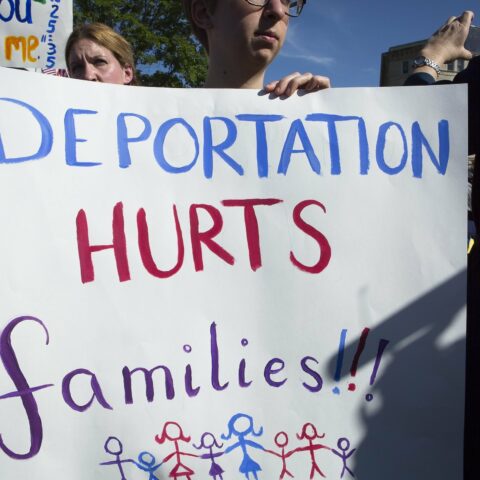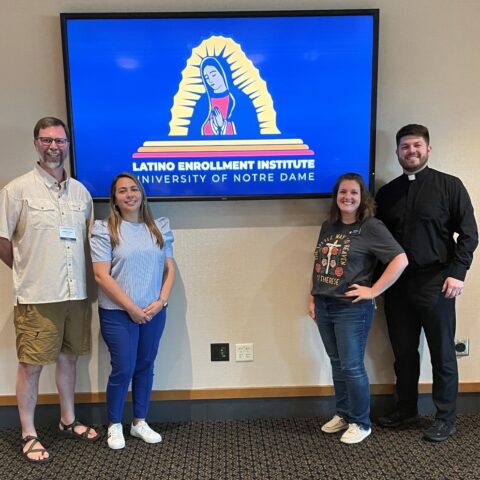While there are only a handful of deaf priests in the country, Subiaco Abbey will ordain Brother Cassian Elkins, OSB, to the priesthood July 14.
Though he is hearing, Brother Cassian worked as a professional sign language interpreter and later an independent living skills instructor before becoming a monk. Brother Cassian, 37, grew up in south Louisiana, surrounded by a vibrant deaf and deaf/blind community.
“I appreciate (the Mass) differently when I’m with the deaf community. It is its own ethos; Christ is coming and encountering the people he’s called to that Mass,” Brother Cassian said.
For years, he’s attended interpreted Masses in Little Rock and assisted with retreats. He has had experience both interpreting the Mass in American Sign Language as well as signing into someone’s hand who is deaf and blind and understands ASL. Though he has specific assignments at Subiaco upon his priestly ordination, he also hopes to offer deaf Masses with approval from the abbot.
“Just to kind of see it in that three-dimensional language; the language comes alive in the word and how it’s proclaimed,” Brother Cassian said, beyond just having printed homilies or reading along. “Deaf Catholics are yearning and thirsting for that encounter.”
In the spirit of Pope Francis, Brother Cassian said it’s important to “go out to the margins and meet” the deaf and deaf/blind community.
“Sometimes we miss that encounter, but we have to work at it. It’s not easy and the one thing that just discourages me is I know many Catholics who have left the Church and went to nondenominational churches that have more access to interpreters. They’re putting us to shame when it comes to accessibility,” he said.
Nancy Quinn, a volunteer interpreter for the 10 a.m. Sunday Mass at St. Mary Church in North Little Rock, said the possibility of a deaf Mass in Arkansas is “extremely exciting because to me, it’s a whole different thing” than just interpreting. On average, about 10 to 15 people attend the Mass and if Quinn is not able to interpret, most do not show up.
“It’d be like a Hispanic population and Vietnamese population having the Mass in their language,” Quinn said, pointing out that “American Sign Language is not signing to English, so I’m not signing word for word … It has its own grammar, its own rules.”
She is quick to point out that while it’s a ministry for her, “it’s not a ministry to the deaf; it does not make it equal. There’s a big gap there. I have continued to pray” for a professional interpreter or the ability to have a deaf Mass. Professional interpreters require a fee and Nancy Quinn said she’s aware that can be a barrier for some parishes.
But for her husband Jim, who was born deaf and also serves in the church as a Eucharistic minister, it is still a blessing to have his wife interpret rather than having to experience the Mass with no interpreter.
“Without an interpreter, you can see what’s going on but to really understand what’s happening like the details of the Mass, like maybe you’ll see a person up there and you know they’re talking or they’re reading or whatever is going on, but you can’t hear it, so if there’s no interpreter, you don’t really know what’s going on,” he said in an interview with Arkansas Catholic with the assistance of an interpeter. “You can tell the atmosphere is good and you can enjoy that, but as far as the details, without an interpreter it just won’t happen.”
Even with the ability to read along for those who are not vision impaired, Jim Quinn said it’s hard to read and look up to “see where we are.”
“For some people it’s difficult to even read along because the English is difficult for them, because it’s like a second language because sign language is their first language. So they’d be skipping parts,” he said.
Brother Cassian said a “large myth is that all deaf people can lip read and the majority cannot.”
“It is difficult for me as deaf person; my eyes just get tired of trying to watch and catch everything, and I just give up,” Jim Quinn said.
In years past, the couple has organized retreats for the deaf community. Having deaf leaders versus interpreters only is important, so they often raise the money. Nancy Quinn would like to see diocese-wide fundraising initiatives to supply money for deaf ministry or other disability ministries.
“That can be a pool where you can have a deaf retreat every year, where you can bring in deaf priests,” she said.
While parishes may not have all the answers, it’s important to at least reach out to deaf Catholics.
“God wouldn’t want us to leave the people out,” Jim said, adding God “wants all people to understand what the message is and to learn and be able to have that time with him.”
For resources on deaf ministry, visit the National Catholic Office for the Deaf at ncod.org/resources.




